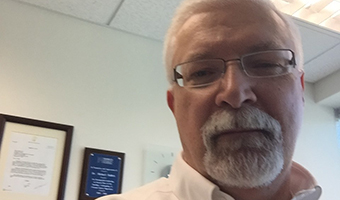“For me, sociology offers a discourse about how we are all born into the middle of our lives—only coming to grips with the forces that shape them as we mature,” says Dr. Michael Hallett, who graduated from Ohio University with his B.A. in Sociology-Criminology with a minor in English in 1988 from the College of Arts & Sciences, then earned his Ph.D. from Arizona State University.
“This work provides a never-ending search mission–an always-on-duty sensibility that I find deeply enriching,” he adds.
He is now full professor of Criminology & Criminal Justice at the University of North Florida and was founding chair of the department in 2005.
“What I enjoy most is that very real sense of urgency and direct connection to my own life that teaching and research in Criminology & Criminal Justice provides, on a daily basis,” he says.
‘A Window onto a World in Dramatic Flux’
“Insofar as sociology/criminology offers a window onto a world in dramatic flux, the work I gravitate toward involves personalized stories of struggle, loss, and (attempts at) redemption,” he says.
“I was fortunate to have two charismatic professors in the [Department of Sociology and Anthropology] very early on, Marty Schwartz and Eric Wagner. I was sitting in a large lecture by Eric Wagner in Morton Hall, in the very back of the room as was my custom.
“The topic was structural violence—how forces beyond the control of individuals harm them and shape their sense of personal identity. This narrative explained parts of my own life. Next lecture, I sat in the very front and continued to do so all the way through graduate school. Schwartz and Wagner literally changed my life.”
‘The Angola Prison Seminary’
His new book, The Angola Prison Seminary: Effects of Faith-based Ministry on Identity Transformation, Desistance, and Rehabilitation,” will be published by Routledge Criminology this Spring.
“This is an outstanding and vivid study of identity transformation and the search for meaning among prisoners serving life and near-life sentences in America’s largest maximum-security prison, in a State with the highest imprisonment rate. Through the development and support of an ‘inmate ministry’, a whole prison is ‘morally rehabilitated’, in so far as this is possible in the context outlined. The book is meticulously researched and powerfully as well as critically written. Its messages are resoundingly clear. I will be recommending it to students of the prison, colleagues, and especially to prison governors.” -Dr. Alison Liebling, Director, Prisons Research Centre, University of Cambridge.
Local Justice Issues
Hallett frequently works on local justice issues in Jacksonville and has completed over a dozen funded projects at UNF, often employing students in the research. He designed Jacksonville Sheriff’s Office Pre-trial Services Unit (drug treatment/diversion) and completed extensive work with local organizations assisting ex-offenders including Prisoners of Christ, Operation New Hope, Hubbard House, the City of Jacksonville, WJCT, JCCI and others.
His areas of concentration in research and teaching are Corrections & Social Inequality, Privatization, Critical Race Theory, and Punishment & Society. Hallett’s current research is focused on faith-based corrections programs, including serving as co-principal investigator on a project at Louisiana State Penitentiary (“Angola”).
Hallett was co-author on “Religiously Motivated Desistance: An Exploratory Study,” which appeared in the International Journal of Offender Therapy and Comparative Criminology in 2015.
Abstract: This article examines the life-history narratives of 25 successful ex-offenders professing Christianity as the source of their desistance. Unstructured in-depth life-history interviews from adult male desisters affirm use of a “feared self” and “cognitive shifts” regarding perceptions of illegal behavior. “Condemnation scripts” and “redemption narratives,” however, differ radically from those uncovered in previous research. Stories of behavior change and identity transformation achieved through private religious practice and energetic church membership dominate the narratives. Findings suggest there are diverse phenomenologies of desistance and that by more narrowly tailoring research to explore subjectivities in the desistance process, important discrepancies in perceptions of agency and structure are revealed. Three prominent desistance paradigms—Making Good, Cognitive Transformation, and Identity Theory—are used to examine the narratives.




















Comments